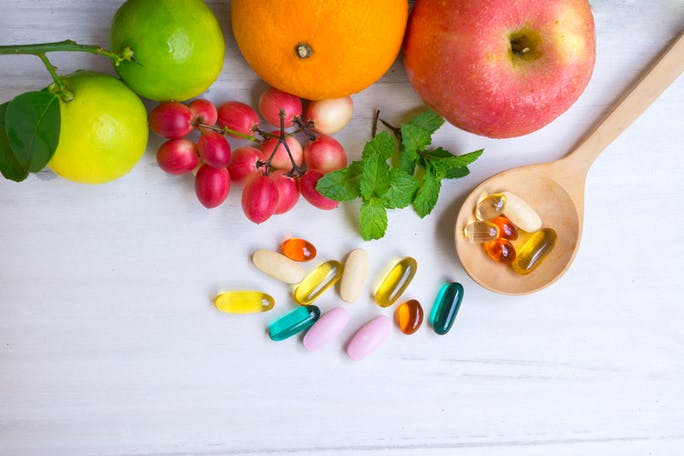Getting Vitamins from Food vs. from Supplements

Getting Vitamins from Food vs. from Supplements
Nowadays our lives can be incredibly hectic. Making sure we're getting enough vitamins and nutrients may be the last thing on our to-do list. It may be easier just to grab vitamins or supplements to replace what you're missing in your diet instead of worrying about what you’re eating.
However, it's important to try and get vitamins from whole foods before turning to dietary supplements. The Dietary Guidelines for Americans says that your nutritional needs should be met primarily through your diet, although you can supplement with vitamins if your needs can't be met through food alone.[1]
Read on to find out about the difference between food and supplements and the importance of getting vitamins from food.
The Difference Between Food & Supplements
Multivitamins and supplements can’t replace food. Whole foods have benefits that supplements just can't provide. Some of the benefits to whole foods include:[1]
- Complex nutrition: Whole foods also contain more complex, varied nutrients.
- Antioxidants: There are numerous choices for antioxidant-rich foods. Whole foods, especially those with dark, rich color not only deliver antioxidants but other necessary nutrients as well.
Some nutrients are most potent when they come from food. Vitamins from food come with other nonessential but beneficial nutrients like carotenoids, and flavonoids.[2]
How to Get Enough Vitamins
With today's modern diet, there are some nutrients that are hard to get enough of—even when we eat properly.
According to the U.S. Department of Agriculture, adult Americans don’t usually get enough calcium, potassium, fiber, magnesium, and vitamins A, C, D, and E.[3] Foods that are high in these nutrients include:[3]
- Calcium: yogurt, cheese, sardines and salmon, soybeans or white beans
- Potassium: sweet potatoes and white potatoes, beans, yogurt, milk, tomato products, bananas, and peaches
- Magnesium: pumpkin, spinach, bran cereal, beans, tofu, Brazil nuts, and almonds
- Vitamin A: organ meats, sweet potatoes, pumpkin, carrots, spinach, cantaloupe
- Vitamin C: guava, oranges, kiwi, raw red sweet pepper, Brussels sprouts, broccoli
- Vitamin D: fatty fish, fortified milk and cereal, fortified orange juice and yogurt, cheese
- Vitamin E: nuts and seeds, turnip greens, peanut butter, avocado, tomato-based products
To get enough vitamins from food, make sure you're eating a healthy, balanced diet made up of a variety of whole foods. Eat enough protein, leafy greens, fruits, and vegetables as well as whole grains.
If you think you're not getting enough vitamins, first try to improve your diet. Ask your healthcare provider for advice if you think you may not be getting enough of certain nutrients. In addition to counselling, they can do a blood test to confirm and give you a recommended diet plan or supplements if needed.
Who Should Take Supplements & What to Consider
Keeping all that in mind, there are some people who may want to consider a regular vitamin supplement. Consider speaking with a health care provider if you fall into any of the below categories:[1]
- Women who may get pregnant or are already pregnant
- Adults aged 50 and up
- Vegans and vegetarians
- People who follow a limited diet
When choosing the right vitamin or supplement, there are a few things you should consider:[1]
Read the labels – Check your vitamin labels to see what nutrients are included, any ingredients you may be allergic to, the serving sizes, and more.
Talk to your healthcare provider or pharmacist – It's possible some vitamins can interact with medications you currently take. You may also want to avoid certain supplements before surgery or medical procedures.
If you're unsure about how to eat a healthier diet or whether you should take a supplement, consider speaking with a healthcare provider.









